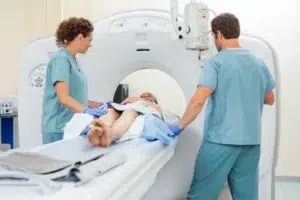Copyright © 2025 Open Medicine Foundation. All Rights Reserved.
The study aims to explore the structural, neuro-vascular, and biochemical differences in the brains of individuals with ME/CFS, Long COVID, and POTS to elucidate the underlying pathology and identify potential targets for effective treatment strategies.
Emerging evidence suggests a potential link between ME/CFS and Long COVID, characterized by similar symptomatology. Additionally, POTS frequently co-occurs with ME/CFS and LC, further complicating symptom management and reducing patients’ quality of life.
Neuroinflammation has recently gained attention as a potential mechanism underlying ME/CFS and LC, with proposed pathways involving sustained glial activation and hypothalamic neuroinflammation. Glutamate dysregulation in the central nervous system, possibly exacerbated by neuroinflammation, may contribute to neuroendocrine dysfunction observed in ME/CFS and LC. Furthermore, reduced brain blood flow could be central to all 3 conditions.
This study aims to investigate brain structural, neuro-vascular, and biochemical differences between groups to deepen our understanding of ME/CFS, LC and POTS pathology and develop effective treatments. By examining astrocyte activity, metabolic variations, cerebral blood flow responses to exercise, and neuroinflammatory markers, we seek to uncover key mechanisms driving ME/CFS symptoms and identify potential therapeutic targets.

OMF is a non-profit 501(c)(3) organization
(EIN# 26-4712664). All donations are tax-deductible to the extent allowed by law.



Open Medicine Foundation®
29302 Laro Drive, Agoura Hills, CA 91301 USA
Phone: 650-242-8669
info@omf.ngo
Copyright © 2025 Open Medicine Foundation. All Rights Reserved.
What are the advantages of giving from your Donor Advised Fund (DAF)?
How do I make a donation through my DAF?
Just click on the DAF widget below. It is simple and convenient to find your fund among the over 900 funds in our system.
Still can’t find your fund?
Gifting of Stock
Broker: Schwab
DTC #: 0164
Account #: 47083887
Account Registered as:
Open Medicine Foundation
29302 Laro Drive
Agoura Hills, CA 91301
Please speak to your personal tax advisor and then email or call OMF at 650-242-8669 to notify us of your donation or with any questions.